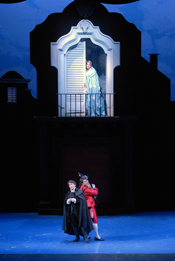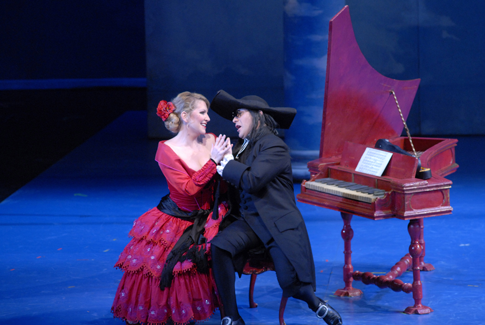
02 Mar 2008
Short on the sides and Full On Top
Perhaps the most beloved comic opera, Rossini’s Il barbière di Siviglia has never left the repertoire.
English Touring Opera are delighted to announce a season of lyric monodramas to tour nationally from October to December. The season features music for solo singer and piano by Argento, Britten, Tippett and Shostakovich with a bold and inventive approach to making opera during social distancing.
This tenth of ten Live from London concerts was in fact a recorded live performance from California. It was no less enjoyable for that, and it was also uplifting to learn that this wasn’t in fact the ‘last’ LfL event that we will be able to enjoy, courtesy of VOCES8 and their fellow vocal ensembles (more below …).
Ever since Wigmore Hall announced their superb series of autumn concerts, all streamed live and available free of charge, I’d been looking forward to this song recital by Ian Bostridge and Imogen Cooper.
Although Stile Antico’s programme article for their Live from London recital introduced their selection from the many treasures of the English Renaissance in the context of the theological debates and upheavals of the Tudor and Elizabethan years, their performance was more evocative of private chamber music than of public liturgy.
Evidently, face masks don’t stifle appreciative “Bravo!”s. And, reducing audience numbers doesn’t lower the volume of such acclamations. For, the audience at Wigmore Hall gave soprano Elizabeth Llewellyn and pianist Simon Lepper a greatly deserved warm reception and hearty response following this lunchtime recital of late-Romantic song.
For this week’s Live from London vocal recital we moved from the home of VOCES8, St Anne and St Agnes in the City of London, to Kings Place, where The Sixteen - who have been associate artists at the venue for some time - presented a programme of music and words bound together by the theme of ‘reflection’.
'Such is your divine Disposation that both you excellently understand, and royally entertaine the Exercise of Musicke.’
‘And there was war in heaven: Michael and his angels fought against the dragon; and the dragon fought and his angels, And prevailed not; neither was their place found any more in heaven … that old serpent … Satan, which deceiveth the whole world: he was cast out into the earth, and his angels were cast out with him.’
There was never any doubt that the fifth of the twelve Met Stars Live in Concert broadcasts was going to be a palpably intense and vivid event, as well as a musically stunning and theatrically enervating experience.
‘Love’ was the theme for this Live from London performance by Apollo5. Given the complexity and diversity of that human emotion, and Apollo5’s reputation for versatility and diverse repertoire, ranging from Renaissance choral music to jazz, from contemporary classical works to popular song, it was no surprise that their programme spanned 500 years and several musical styles.
The Academy of St Martin in the Fields have titled their autumn series of eight concerts - which are taking place at 5pm and 7.30pm on two Saturdays each month at their home venue in Trafalgar Square, and being filmed for streaming the following Thursday - ‘re:connect’.
The London Symphony Orchestra opened their Autumn 2020 season with a homage to Oliver Knussen, who died at the age of 66 in July 2018. The programme traced a national musical lineage through the twentieth century, from Britten to Knussen, on to Mark-Anthony Turnage, and entwining the LSO and Rattle too.
With the Live from London digital vocal festival entering the second half of the series, the festival’s host, VOCES8, returned to their home at St Annes and St Agnes in the City of London to present a sequence of ‘Choral Dances’ - vocal music inspired by dance, embracing diverse genres from the Renaissance madrigal to swing jazz.
Just a few unison string wriggles from the opening of Mozart’s overture to Le nozze di Figaro are enough to make any opera-lover perch on the edge of their seat, in excited anticipation of the drama in music to come, so there could be no other curtain-raiser for this Gala Concert at the Royal Opera House, the latest instalment from ‘their House’ to ‘our houses’.
"Before the ending of the day, creator of all things, we pray that, with your accustomed mercy, you may watch over us."
The doors at The Metropolitan Opera will not open to live audiences until 2021 at the earliest, and the likelihood of normal operatic life resuming in cities around the world looks but a distant dream at present. But, while we may not be invited from our homes into the opera house for some time yet, with its free daily screenings of past productions and its pay-per-view Met Stars Live in Concert series, the Met continues to bring opera into our homes.
Music-making at this year’s Grange Festival Opera may have fallen silent in June and July, but the country house and extensive grounds of The Grange provided an ideal setting for a weekend of twelve specially conceived ‘promenade’ performances encompassing music and dance.
There’s a “slide of harmony” and “all the bones leave your body at that moment and you collapse to the floor, it’s so extraordinary.”
“Music for a while, shall all your cares beguile.”
The hum of bees rising from myriad scented blooms; gentle strains of birdsong; the cheerful chatter of picnickers beside a still lake; decorous thwacks of leather on willow; song and music floating through the warm evening air.

Perhaps the most beloved comic opera, Rossini’s Il barbière di Siviglia has never left the repertoire.
With its struggle between love and greed, youth and age, its general joie de vivre, along with gem after gem of “hummable” musical numbers, it is an audience favorite. Myriad opportunities for sheer technical dazzle give connoisseurs an opportunity to savor the more refined vocal moments of the evening. Lyric Opera’s current run of Barbiere, seemingly like Opera itself at the turn of the Millennium strives to please all of the people all of the time, succeeding both as high art and as showpiece. The opera’s elements seem traditional enough, and yet, even a perfunctory glance beneath the surface yields deeper levels of meaning. John Conklin’s sets, which were inspired by the work of Magritte are representational, with surrealist elements. Likewise, Michael Stennets’ costumes were both traditional and whimsical.
A Barbiere resounds or thuds because of style, comic insight, and vocal ingenuity. Lyric’s Barbiere managed to sparkle mostly because of the immense talent of Joyce DiDonato, who, in her house debut as Rosina, was both vocally and dramatically a perfect fit for the role. It must be said that DiDonato is a revelation. Her cavatina, “Una voce poco fa” was a lesson in bel canto tradition. DiDonato’s ornaments were rapid-fire and athletic, inspired, appropriate. The voice was exciting in the top with warmth to spare in the lower and middle registers. It must also be said that DiDonato is an engaging actress; her Rosina was sympathetic and charming. During “Una voce poco fa”, when the text returns, “Io son docile”, in an inspired moment, DiDonato threw a mini-tantrum, juxtaposing Rosina’s outward subservience with her inward rebellion. “Contra un cor”, Rosina’s second act aria, was staged as a “voice lesson” and DiDonato was uproariously funny in her impersonation of an amateur singer, placing her hands on various parts of the body to simulate physicalized learning. When DiDonato’s Rosina looks to Bartolo for approval, Bartolo furthers the joke by making hand gestures that suggested voice placement and grace. DiDonato’s triumph was complete when, immediately before the cadenza, she mimed exaggeratedly deep breathing.
Opposite DiDonato is John Osborn, who replaced Juan Diego Florez, the scheduled Almaviva, at the 11th hour. Florez’s return had been much anticipated by Chicago operagoers, and so Osborn’s bravery in assuming the star mantle should be commended. Osborn does not suffer greatly by comparison to the singer he replaces. His leggero voice coasts easily through the score, which is notoriously difficult for singers who are less equipped for this specialty role. In fact, the finale “Cessa di più resitere” is often cut because of its fiendish difficulty. The tenor wins the audience with his agility and stratosphereic finale. If criticism must be given, it is that Osborn’s voice takes a moment to warm up; his “Ecco ridente in cielo” is perhaps a little heavier than the rest of his singing in the evening, but he sails through the cabaletta with only a little effort and by the second scene, sighs through the recit with a lyricism not often heard from singers in major houses.
Sung by American pin-up baritone Nathan Gunn, the production’s Figaro is a treat, not only for the sporty physique, which the actor proudly displays during his “Largo al factotum” (staged as a dressing scene), but also for his generous singing. Contrary to some critical opinion, this listener finds Gunn’s voice to be adequate of weight for such a large venue as the Civic Opera House. Gunn had no trouble projecting over full orchestra for his arias and duets, but, surprisingly, he drops several syllables of his recitatives, with only a harpsichord to balance. A little more careful detail to vocal energy may be in order, but the singer’s execution is enjoyable, and Gunn’s relaxed air on stage is very welcome.
 Joyce DiDonato as Rosina and John Osborn as Count Almaviva
Joyce DiDonato as Rosina and John Osborn as Count Almaviva
Baritone Philip Krauss gives a serviceable Doctor Bartolo. His reading paled in comparison to the lovers; however, his diction is crisp, and his aria “La calunnia è un venticello” was richer for it. Also of note is his lovely falsetto that we enjoyed in the opening bars of “Quando mi sei vicina”. In spite of his best efforts, Maestro Donato Renzetti fails in his attempt to encourage the orchestra to play so loud as to cover the singers during the quintet, and the overture, surprisingly slow, was out of tune.
Still, this Barbière is a must see for anyone who loves this comic work, and anyone who treasures the bel canto tradition is foolish to ignore the opportunity to hear Ms. DiDonato teach us how Rossini must be sung.
Gregory Peebles © 2008